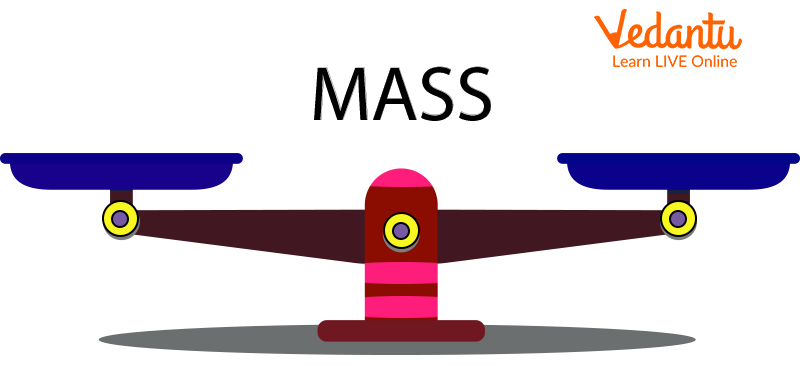




Why Understanding Mass Matters in Mathematics
In Mathematics, mass refers to the quantity of matter in an object. Mass is generally measured by how much something weighs. The more matter something has, the more it will weigh. For example, the mouse has more matter than an ant, hence, the mass of a mouse will be higher.
Remember, the size of something does not determine that the particular object has more matter. For example, although both golf balls and ping-pong balls are of the same size, the golf ball has more mass as it has more than a ping-pong ball. Also, the golf ball has more mass because it is solid and the ping-pong ball is hollow.

Measuring Unit Mass
Mass Definition In Maths
Mass can be best defined as the amount of matter present in any object or a person. Everything present around us has mass. For example, a chair, a table, a pen, a glass, etc. Remember even air has mass in it.
From the mass definition given above, we can say that an object's heaviness or lightness depends on its mass.
Mass Example
The gold bar given below looks quite small but has a mass of 1 kilogram or 2.2 pounds.

1 Kg Gold Bar
How is Mass Measured?
Mass is measured in Kilograms, grams, and tonnes (Metric Units) or Ounces and Pounds (US Customary Units).
What is the Standard Unit of Mass?
The standard unit of mass is kilogram. Kilogram is abbreviated as Kg. The unit kilogram is used to measure the mass of heavy objects such as bags of grains, stones, vegetables, etc.
On the other hand, the smaller unit of mass is grams. Grams is abbreviated as G. It is used to measure the mass of lighter objects such as a quarter teaspoon of sugar, a small paperclip, one US bill, etc.
Remember:
1 Kg = 1000 g or 1000 g = 1 Kg
Are Both Mass and Weight the Same?
No, both mass and weight are not the same things. Mass is referred to as the quantity of matter an object has whereas weight is referred to as the Gravitational force with which the Earth attracts the masses towards its center.
You must have observed that people often use both mass and weight interchangeably because gravity is almost the same everywhere and we don’t often observe differences.
Note: The mass of an object is always the same everywhere. But weight increases or decreases due to the higher or lower gravity.
The mass of an object can never be zero whereas the weight of an object can be zero if no gravity acts upon it, such as in space.
Conclusion
In short, mass is a measure of how much matter is there in an object. In the metric system, it is generally measured in grams, kilograms, and tonnes. Weight and Mass differ from each other. If you weigh something on another planet, its mass will be the same but its weight will be different. As weight depends on the gravity and gravity is different in every planet. Hence, when you are floating in space, you are weightless, but you still have a mass.
FAQs on Mass in Math: What It Means and How to Measure It
1. What is the basic definition of mass in mathematics?
In mathematics, mass is a measure of the amount of matter or 'stuff' contained within an object. It essentially tells us how heavy an object is, independent of gravity. For example, a heavy book has more mass than a single sheet of paper.
2. What are some common examples of mass we see in daily life?
You can see examples of mass everywhere. Some common ones include:
- A bag of rice having a mass of 5 kilograms (kg).
- A small apple having a mass of about 150 grams (g).
- A standard car having a mass of over 1,000 kilograms.
These are measured using a weighing scale.
3. What is the difference between mass and weight?
This is a very common point of confusion. Mass is the amount of matter in an object and is constant everywhere. Weight, on the other hand, is the force of gravity acting on that mass. An astronaut's mass is the same on Earth and the Moon, but their weight is much less on the Moon because of lower gravity.
4. What are the standard units used to measure mass?
The standard units for measuring mass are grams (g) and kilograms (kg). Grams are used for lighter objects, like a pencil or a cookie, while kilograms are used for heavier objects, like a person or a watermelon. Remember that 1 kilogram is equal to 1,000 grams.
5. If two objects are the same size, does that mean they must have the same mass?
No, not necessarily. The size (or volume) of an object does not determine its mass. For example, an inflated balloon and a cricket ball might be the same size, but the cricket ball has significantly more mass because it is made of a denser material. Mass depends on what an object is made of and how much of it there is.
6. How is mass typically measured for a Maths problem?
Mass is measured using a weighing scale or a balance. To find the mass of an object, you place it on the scale. If you are using a container, you first measure the mass of the empty container and then subtract it from the total mass of the container with the object inside.
7. Why is it important to learn about mass in mathematics?
Understanding mass is crucial as it is a fundamental concept in the topic of Measurement. It helps in solving real-world problems involving addition, subtraction, and conversion of units (grams to kilograms). It also lays the foundation for more advanced concepts like calculating density (mass per unit of volume).
8. Is the idea of mass different in Maths compared to Physics?
Yes, the focus is slightly different. In primary and middle school Maths, mass is primarily treated as a measure of how heavy something is. In Physics, mass is more formally defined as a measure of an object's inertia—its resistance to a change in motion. While the concepts are related, Physics explores its relationship with force and acceleration in greater depth.

















